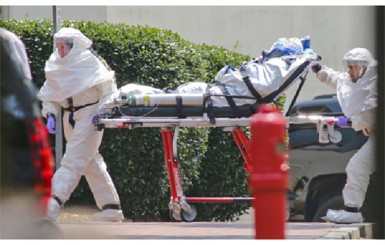By mid October the west – and America particularly- had conceded that it had completely underestimated the threat of Ebola. After Thomas Duncan, the Liberian national who had travelled to America from his homeland had died at the Texas Presbytarian Hospital Ebola had ceased to be a West African problem and begun to be seen. In America, overnight, it begun to be perceived as a national security issue. As it turned out, America’s response was far from impressive. The country’s medical gurus were insisting that public percerptions of the threat level were being grossly exaggerated.
Those assurances, however, lacked reassuring credentials in the face of evidence in the west as a whole that the disease was spreading and that the medical protocols associated with its containment and effective treatment were being overlooked. After nurses at both Texas Presbytarian and a Spanish hospital became ill with the disease after they had treated Ebola victims evacuated from Africa.
In the west the response from the media, the public and the various social, cultural and political institutions to the realization that Ebola had slipped through the west’s defences amounted to a mix of media frenzy and placing the blame at the door of the authorities. In Europe, Brussels was demanding to know how Ebola had arrived on Europe’s doorstep and in Washington the much vaunted Center for Disease Control (CDC) was receiving a thorough ‘roasting’ from Congress and the media over seemingly blatant breaches of hospital and travel protocols associated with the containment of the disease. America was feasting, albeit reluctantly, on generous helpings of humble pie.

Media houses in the west are expert at raising the ‘temperature’ of an issue over an unbelievably short period. Almost overnight, they transformed Ebola from the status of ‘foreign news’ to a domestic emergency. Sometimes, the reporting became sufficiently theatrical and intense as to deepen the sense of apprehension that had already become apparent in parts of America.
Virtually overnight the status of the west as spectators to Ebola had changed. Western media and analysts of international relations have always been inclined to employ the tool of compartmentalization in their analyses of major global crises; so that there are some events – and Ebola had been one of those up until recently – that have been presented as though they were what we refer to in the trade as ‘fillers.’ Again, though perhaps to a lesser extent, it is much the same in Europe.
It has been the same with events that have to do with famine in distant lands, political problems in other regions, wars, terrorist acts and other disruptive occurrences.
As has been conceded in the matter of the seemingly sudden and sensational emergence of Islamic State, for example, America and the west as a whole, often, do not read the tea leaves correctly. That, by Washington’s own admission, was the case with Islamic State.
It was much the same with the contemporary upheavals in the Middle East. The term Arab Spring had been invented in the west to describe what it saw as likely regime change in countries in the region where undemocratic rule had taken root over many decades. To a considerable extent Washington may have gotten its way as far as regime change was concerned though what has since surfaced in place of those regimes that have been removed is the threat of unprecedented levels of upheaval in the Middle East as a whole and what would appear to be the likely balkanization of Libya, Iraq and Syria.
The analyses that have, in the main, limited the conflict in the Middle East to a particular geographical space have been stood on their heads chiefly though not exclusively by the macabre beheadings of westerners by Islamic State which began with the America’s Thomas Foley.
After that, Washington could no longer continue to detach itself from the menace of Islamic State and the new dimension that it was now adding to the pre-existing problems in the Middle East. What America’s and the west’s belated engagement in the current Middle East crisis, however, is that Islamic State has benefitted from a considerable headstart in spreading a doctrine of fanatical adherence and terror that exerts a powerful influence over ‘believers’ in Europe and elsewhere.
Much earlier, the events of 9/11 had similarly stirred American emotions and lent an altogether more significant meaning to the concept of homeland security but that was only after the country had endured the most poignant act of terrorism in living memory. One might argue that after that, America and the west as a whole, ought to have been much more vigilant.

Now Ebola. Former United Nations Secretary-General Kofi Anan is altogether correct in his assertion that Ebola would have caught the attention of the international community much earlier, but for the fact that the current outbreak had its origin in West Africa. Ebola, like so many other issues of global importance, simply caught America and the rest of the west ‘minding their own business.’ The prevailing state of emergency in the west is the price that they are paying for their initial inattentiveness.
Almost overnight there have been heightened levels of flight restrictions and the screening of passengers travelling from affected countries. Almost overnight Ebola has become one of President Barack Obama’s main political demons.
Ebola is no longer some distant malady at which America and the rest of the west can simply throw money and medicines. It has become a killer on their doorstep.
But it is not only the west that must worry about the behaviour of Ebola in a globalised and interconnected world. Trade and travel facilitate the spread of the disease and in that context nowhere is too far from anywhere else.
We in the Caribbean with our sub standard port monitor-ing and security systems and our wholly inadequate health infrastructure have good reason to sit up and take notice.
In the current circumstances it is difficult for us not to take account of the vulnerability associated with our open borders and the facility of ‘free movement’ which it allows.
If we in Guyana have not yet done so we would do well to come to terms with the reality of international travel and how the combination of free movement of people and the ease with which Ebola can pass from person to person render us vulnerable.
There are lessons here for the media too. America would appear now to be paying a price for underestimating Ebola and if that is so the media must help shoulder the blame.
If the issue is yet to be raised publicly, we in Guyana must, at some stage, begin to seek to deternine how the worsening Ebola situation will impact on current international trade pursuits, including, interestingly, already announced plans to increase rice sales to Africa.
It would do us all a power of good to commence a national discourse across social and political lines on how we can strengthen our defences against Ebola.
What we have an opportunity not to do is to assume – like the west appeared to have been doing until recently – that Ebola falls into the category of ‘someone else’s business. All things considered, Africa is not that far away at all.




